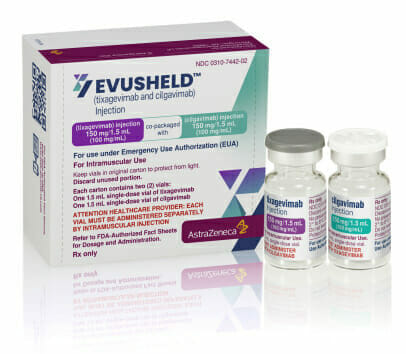

The Food and Drug Administration has authorized the first monoclonal antibody medication for preventing COVID-19 in certain immunocompromised adult and pediatric patients. One dose of the drug may be effective for six months, the agency says.
AstraZeneca’s Evusheld consists of tixagevimab and cilgavimab administered together via injection. The cocktail has been granted emergency use authorization to be used before exposure to the SARS-CoV-2 virus. The goal is to protect people who are unlikely to mount an adequate immune response to COVID-19 vaccination, FDA announced Wednesday.
Evusheld neutralizes all previous SARs-CoV-2 variants to date, and AstraZeneca is working quickly to establish its efficacy against the new omicron variant, Mene Pangalos, Exec VP, BioPharmaceuticals R&D, AstraZeneca, said in a statement.
The other injectable monoclonal antibody currently available is Regeneron’s REGEN-COV, which was authorized in late July for use after — but not before — exposure to the SARS-CoV-2 virus to prevent severe illness in people at high risk of poor outcomes from COVID-19.
Qualifying recipients
Recipients of Evusheld should not be currently infected with the virus or have been recently exposed to an infected individual, FDA noted. They must also have either moderate to severely compromised immune systems due to a medical condition or due to taking immunosuppressive medications or treatments, or they must have a history of severe adverse reactions to a COVID-19 vaccine and/or vaccine components.
Although vaccines have been proven to be the best defense available against COVID-19, some individuals require an alternative prevention option, said Patrizia Cavazzoni, M.D., director of the FDA’s Center for Drug Evaluation and Research.
“Today’s action authorizes the use of the combination of two monoclonal antibodies to reduce the risk of developing COVID-19 in these individuals,” she said in a statement.
Evusheld is not authorized for the treatment of COVID-19 or for post-exposure prevention of the disease, and is not a substitute alternative for vaccination in individuals for whom COVID-19 vaccination is recommended, FDA said.
A fact sheet for healthcare providers has been made available.




